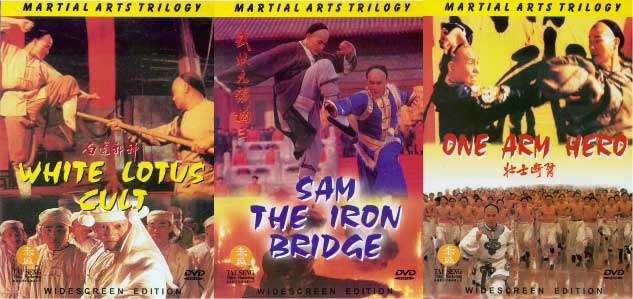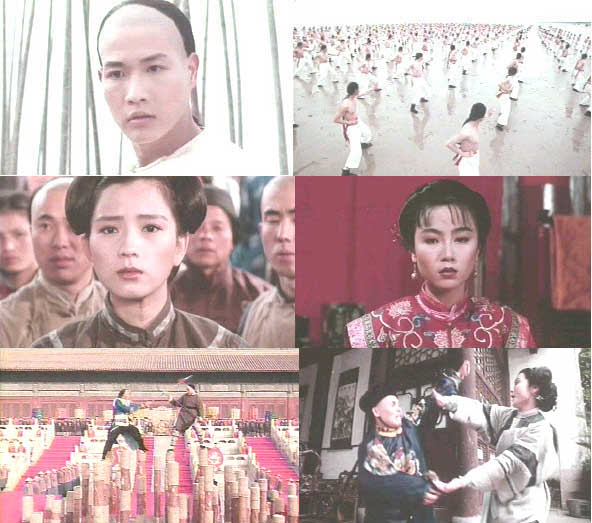Martial Arts Trilogy

This trio of films – White Lotus Cult, Sam
the Iron Bridge and One Arm Hero – has generally fallen far below the radar
when the martial art films of the early 90s are referenced. Dismissed to some
degree as an attempt to cash in on the popularity of Jet Li’s Once Upon a
Time in China series and released among a glut of higher profile martial
arts films, they nearly disappeared at the box office in 1993 (HK $646,000;
$434,000 and $166,000 according to the HKMDB). With Fennie Yuen and Lily
Li being the most recognizable names, the cast of relative unknowns – To
Siu-chun, Yeh Cheun-chan, Wong Kam Kong, Chi Chuen-hua, Yu Hai - certainly
did not help attract an audience either. All the films were produced at the
same time – with five of the actors appearing in all three films – and were
released one right after the other for only one week each in the Hong Kong
theaters.

Perhaps time has treated these films kindly, but watching them now in a period
in which Hong Kong seems unable to produce a good action film, the trilogy
seemed wonderfully basic to me with a coherent interesting storyline, a serious
tone and well performed martial arts and wire work. It never approaches the
dizzying heights of many of its contemporary martial arts films in either
imagination or complexity, but there are some solid pleasures to be obtained
from them. It really has to be seen in the correct order of the films and
they should be viewed in quick succession because it is really one story
and much of the emotional impact of the films depend on the relationships
of the characters and the tragedy that strikes many of them by the end.

It tells the story of one man who through the use of his kung fu skills and
his integrity rises from a lowly position in life to one of importance within
the imperial government. It treads some of the same territory as does the
OUATIC films as it too takes place near the end of the Ching Dynasty (late
1800’s) – a period in which the government is corrupt and crumbling, foreigners
are making encroachments into China and technology from the West is forcing
China to re-think its position in the world. In the films, the main character
played by To Sui-chun (referred to at various time as Sam or San) tangles
with the fanatics of the White Lotus Cult, opium traffickers, corrupt officials,
Japanese pirates and greedy foreigners. Many of the characters introduced
into the film are quite interesting and well played, but unfortunately two
of the main characters – Sam and his girlfriend, Butterfly played by Yeh
Chuen-chan – are fairly one-dimensional and the least interesting characters
on the screen. The film doesn’t really strike one as big budget – but at
the same time there are many scenes that feel big with lots of extras and
good looking sets. Overall, the three films make for an enjoyable if not
an inspired viewing experience.

White Lotus Cult
At the beginning of this trilogy, Sam is
a mere porter of goods and has just made a journey from Canton to Beijing
along with his friend. He immediately finds himself in the middle of a chaotic
setting with the White Lotus Cult headed by Chin Chen (Chi Chuen-hua) stirring
up passions and hatreds against the foreigners. Though the government publicly
condemns the cult, in fact the Empress (Old Buddha) is in a secret alliance
with them and wants to use them to force concessions by the foreigners. Chin
on the other hand is using the alliance for his own purposes – one of them
to find the “White Lotus Classics” – a series of secret writings that will
cure his growing illness and give him great powers.

These writings are held by Chan – an old colleague of Chin’s – who is a loyal
member of the Ming faction that wants to overthrow the current dynasty. After
an attempt to assassinate the Empress, Chan and Sam find themselves together
on a train going back to Canton. Chan has been badly wounded and in order
to get Sam to help him he gives him a pill to dramatically increase his martial
skills. Martial Arts the easy way! In Canton the two of them meet up with
Chan’s daughter Butterfly and his old girlfriend, Lily Li, also a kung fu
artist and a member of the rebel force. The White Lotus Cult has followed
them to Canton though – along with Sam’s friend who has joined them – and
the four of them have to band together to fight the fanatical force.

The focus of this film tends to be more dramatic than action, but there still
are a number of action scenes – the two best being the one between Chin and
Chan inside the Forbidden City that has them turning the City into one large
battlefield in which they fiercely duel one another and the final one with
Sam and Lily battling Chin on top of a giant burning wooden scaffolding structure.
The action is quite well done and To shows some real skills that are to be
better displayed in the next two films.

My rating for this film: 6.5

Sam the Iron Bridge
Sam is now settled down in Canton with a
job as a rickshaw driver and is being pressured by friends and Lily to marry
sweet patient Butterfly. To earn some money for the wedding, he enters a
kung fu match in which he easily defeats his opponents until a mystery “man”
jumps onto the platform and gives him a tough fight. Earlier in the film,
this same character had entered an inn and thrashed a number of the customers
for no apparent reason. This “man” is in fact Fennie Yuen – a spoiled royal
princess – daughter of Wong Kam Kong – and she is simply trying to see how
good her kung fu skills are. Both Fennie and Wong Kam Kong had very quick
appearances in the first film, but take center stage in this one. Fennie
steals the film whenever she is in it.

Wong is a high government official with his hands very much in the opium
trade and when the government sends an edict and an official to stop the
trade and to ban opium Wong tries to stop him. The new official creates an
alliance with the incorruptible Admiral Kwan (Yu Hai from the Shaolin Temple
trilogy and also briefly in the first film) who is in charge of customs.
Wong sends a group of ninja like killers to do away with the official but
Sam witnesses the attack and is able to save him. They make Sam his unofficial
bodyguard. Fennie stays in the background – she is falling in love with Sam
and his kung fu skills – and she keeps a wary eye on her corrupt father.

In a “friendly” match with Wong’s bodyguard, Sam is badly injured by the
“Bloody Palm” technique and is on the verge of death. As you likely know,
the only cure for this is having sex with a virgin and Fennie happily meets
the requirement. Just like a guy, Sam looks to enjoy this encounter – even
in his near death state – but afterwards feels very awkward around Fennie
and tries to avoid her. Butterfly seems a bit put out too as no doubt she
is a virgin too and would likely have volunteered! It is decided that a kung
fu match will decide who will replace the Admiral and Sam and the bodyguard
match deadly skills against one another on top of a series of wooden poles.

My rating for this film: 7.5

One Arm Hero
The final film in the series takes on a
much more somber and tragic resonance as it seems to imply that there is
no place in these times for an ethical man in government. Not surprisingly
Sam won the martial arts contest and is now in charge of customs and the protection
of the coastline of southern China. Businessmen and officials (Wong Kam Kong
is still around) attempt to bribe Sam with money and marriage to Fennie,
but after he refuses they look for an opportunity to bring him down.

This opportunity comes when some Japanese pirates come ashore to kill and
plunder and Sam’s army can do little to stop their modern firepower with
only swords at their disposal. Sam is able to get some rifles from Prince
Hing, an evil favorite of the court, but there are not nearly enough to fight
off the pirates. When Sam hears that the pirates are once again on the verge
of attacking, he raids the royal treasury to get money to purchase weapons
from the British. This is the opening that his enemies were looking for.

Though he is able to defeat the pirates, charges are brought against him
for taking royal funds without authority and he is imprisoned. His men want
to lay down their lives for him, but he refuses to allow this and says he
trusts the government in Beijing to do the right thing. His enemies though
are not planning to let that happen and attempt to murder him on the train
trip to his trial. He escapes with the help of Fennie, but has to chop off
his arm to stop poison from killing him. As in true one-armed hero films
this does not stop him and he comes back to fight Prince Hing with Lily Li
at his side. The film ends on a rather downbeat ambiguous note and one has
to wonder if yet another part in the film was planned or if the dejected
mood is just what the filmmakers were looking for.

My rating for this film: 7.0
Note: I am not sure if "Martial Arts Trilogy"
is really the name of this series or simply the name that Tai Seng gave to
them in its DVD release. One fellow wrote in to say the more common name
is "Sam the Iron Bridge Trilogy".

















